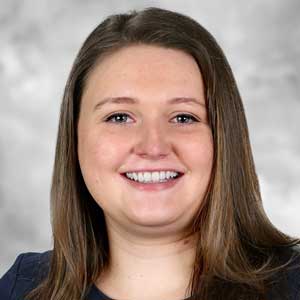Lessons in Family Medicine from the
Ancient Greeks
“I’ve always been interested in the history of medicine,” said Jenna Georgiou, MD, a family medicine physician in Providence, Rhode Island and 2024 recipient of the Sandra L. Panther Fellowship. The AAFP Foundation’s Center for the History of Family Medicine awarded Georgiou the $3,000 grant for her research project, “Lessons in Family Medicine from the Ancient Greeks.”
As an undergraduate at the University of Pennsylvania, Georgiou (who is Greek and Italian) majored in classical studies, combining ancient Greek and Roman history, culture and languages. She focused on ancient Greek medicine and the body of writings by the physicians who followed Hippocrates, studying these works through a lens of women’s health.
Georgiou went to Rutgers Robert Wood Johnson Medical School, originally intending to become an OB/GYN. One day, after participating in a simulated patient encounter, the actor playing her patient stepped out of character and told Georgiou, “I just wanted to let you know I felt very safe with you, like I could be vulnerable and open up to you.”

“That was such an amazing feeling,” Georgiou said. “I was talking to my mentor about it and he said, ‘Oh, that’s family medicine.’” She was hooked.
The Center for the History of Family Medicine fellowship allowed Georgiou to continue her exploration of ancient medicine after completing her residency in July 2024. She wanted to learn how it inspired the development of modern family medicine — a goal that aligned with the mission of the CHFM, which serves as the principal resource center for materials relating to the evolving history of family medicine.
In addition to the fellowship, the CHFM awards up to $3,000 annually for an oral history research project, sponsors an essay contest for medical students and residents, curates and houses a library of audiovisual materials and artifacts at the AAFP Foundation and maintains a searchable online catalog.
Georgiou spent a week in Kansas City, where she had full, unrestricted access to the CHFM archives and “Kelly, the amazing archivist” suggested materials that would be useful to her research. The Center also helped connect her to former fellows with similar interests.
“The history of medicine in general is an underutilized body of knowledge and the history of family medicine even more so, because we’re a younger specialty,” Georgiou said, noting that examining the history of family medicine can help inform its future.
Ancient Greek medicine looked at the whole patient, similar to the shift taking place in family medicine today to a shared decision-making model that encourages open discussions between doctors and patients.
“That’s truly what ancient Greek medicine was — sitting down with your patients, listening to them, hearing about their home life and what actually makes them tick,” she said.
Georgiou believes of all the medical specialties, family medicine is most aligned with the humanities because its practitioners are lifelong learners.
“We have to know a little bit about everything,” she said.